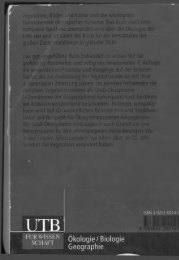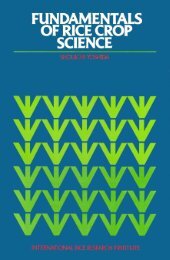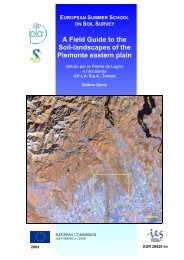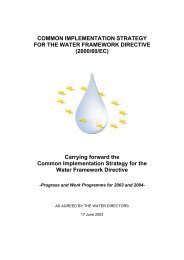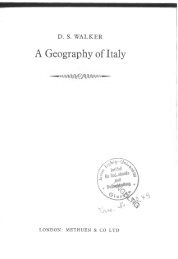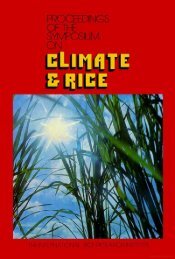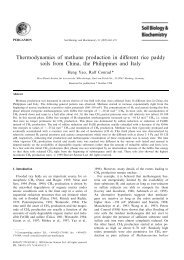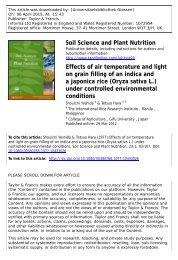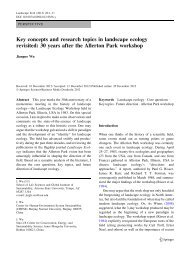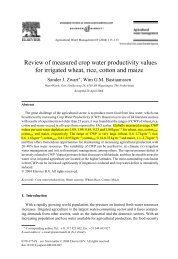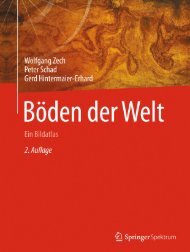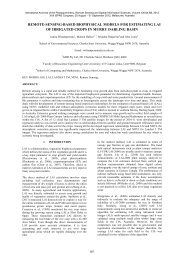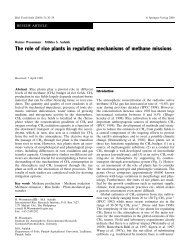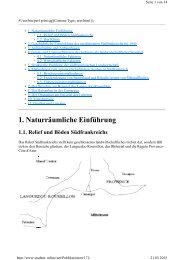Sustainability of European Irrigated Agriculture under Water Framework Directive and Agenda 2000
Sustainability of European Irrigated Agriculture under Water Framework Directive and Agenda 2000
Sustainability of European Irrigated Agriculture under Water Framework Directive and Agenda 2000
Create successful ePaper yourself
Turn your PDF publications into a flip-book with our unique Google optimized e-Paper software.
1.<br />
FOREWORD<br />
The <strong>Water</strong> <strong>Framework</strong> <strong>Directive</strong> (WFD) is probably the most ambitious <strong>European</strong> effort for a<br />
common integrated management <strong>of</strong> environmental resources in the Union. The WFD states<br />
that <strong>Water</strong> is not a commercial product like any other rather it is an heritage which must be<br />
protected. <strong>Irrigated</strong> agriculture is the largest consumer <strong>of</strong> water in <strong>European</strong> Mediterranean<br />
areas, <strong>and</strong> an important economic activity in the rest <strong>of</strong> the <strong>European</strong> l<strong>and</strong>scape. On the other<br />
h<strong>and</strong>, the Common Agricultural Policy (CAP) influences decisively the use <strong>of</strong> water in<br />
irrigated systems, thus the need for research on the optimal integration <strong>of</strong> both policies<br />
conducted by the WADI 1 consortium.<br />
This book aims to present to the <strong>European</strong> society the results <strong>of</strong> the WADI project, trying to<br />
provide a <strong>European</strong> wide summary <strong>of</strong> potential consequences <strong>of</strong> the WFD application in<br />
irrigated systems as well as detailed country results. Finally, some additional chapters are<br />
included presenting a review <strong>of</strong> methodology, applied scenarios, the water framework<br />
directive implementation <strong>and</strong> the original research objectives.<br />
All research institutions involved in the WADI Project want to express acknowledgement to<br />
the <strong>European</strong> Commission for the financial support it <strong>of</strong>fered to our project through the V<br />
<strong>Framework</strong> Programme for RTD (1998-2002). Also we have been supported by DG-ENV <strong>and</strong><br />
JRC-IPTS staff which contributed to the improvement <strong>of</strong> the technical quality <strong>of</strong> our work.<br />
Nevertheless the WADI consortium is responsible for the final result <strong>and</strong> the opinions<br />
contained in this publication.<br />
1<br />
The WADI consortium was financed through the 5 th <strong>Framework</strong> Programme for RTD <strong>under</strong> the contract<br />
[EVK1-<strong>2000</strong>-00057] <strong>and</strong> with the title:‘<strong>Sustainability</strong> <strong>of</strong> <strong>European</strong> irrigated agriculture <strong>under</strong> water<br />
framework directive <strong>and</strong> <strong>Agenda</strong> <strong>2000</strong>’. The Universidad de Córdoba was the coordinator <strong>and</strong> the partners<br />
were: Univ. Valladolid (E); Federación Nacional de Comunidades de Regantes (E); Univ. Evora (Pt); Centro Studi<br />
Aziendale (I); Univ. Bologna (I); Univ. Thesaloniki (Gr); Univ. Cranfied (UK); Joint Research Centre (COM-EU).<br />
9



